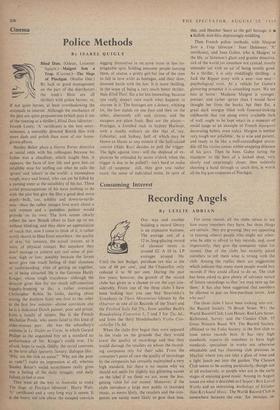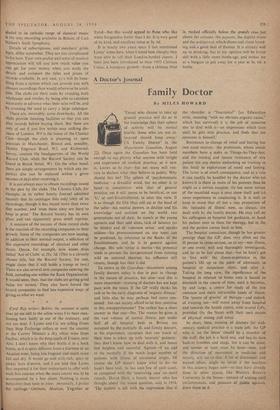Consuming Interest
Recording Angels
By LESLIE ADRIAN
ONE way and another building a record library is an expensive business. The average cost of a 12 in. long-playing record of classical music is around E2.. A 10 in. LP averages around 30s. Until the- last Budget, purchase tax eras at the rate of 60 per cent., and the Chancellor only reduced it to 50 per cent. During the past few years, however, the growth of the record clubs has given us a chance to cut the cost con- siderably. From one of the three clubs I have been looking into you can buy Stravinsky's Symphony in Three Movements (chosen by the Observer as one of its Records of the Year) and the Firebird Suite for 35s., from another Bach's Brandenburg Concertos 1, 2 and 3 for 22s. 6d., and from the third 7s.lendelssohn's Violin Con- certo for 15s. 6d.
When the clubs first began they were opposed in the trade on the grounds that they would lower the quality of recordings and that they would damage the retailers on whom the record- ing companies rely for their sales. From the consumer's point of view the quality of recordings by the companies has certainly maintained a very high standard, but there is• no reason why we should not settle for slightly less glittering names on the label if we think we are, none the less, getting value for our money. Moreover, if the clubs introduce a large new public to recorded music, as seems likely, the retailers and the com- panies are. surely more likely to gain than lose. For some reason, all the clubs refuse to say how ;many members they have, but three things are. certain : they are growing, they are appealing to (among others) people .who might not other- wise be able to afford to buy records, and. most importantly, they give the consumer value for money. One of the clubs has recently asked members to tell them what is wrong with the club. Among the replies there are suggestions which indicate that many more people would buy records if they could afford to do so. The club has been asked to give plenty of advance notice of future recordings so that 'we may save up for them.' It has also been suggested that members be allowed to pay on hire-purchase terms. And why not?
The three clubs I have been looking into are: the Record Society, 70 Brook Street, WI; the World Record Club, Lion House, Red Lion Street, Richmond, Surrey; and the Classics Club, 55 Great Western Road, W9. The Record Society, affiliated to the Folio Society, is the first club to issue stereo records here. It has very high standards, expects its members to have high standards, specialises in works not otherwise obtainable and has charming club premises in Mayfair where you can take a glass of wine and a light lunch out into the garden. The Classics Club seems to be aiming particularly, though not at all exclusively, at people who are in the early stages of enjoying good music. Among its August issues are what it describes as Chopin's Best LovM Works and an interesting Anthology of Elitabe- than Keyboard Music. The World Record Club is somewhere between the two: for instance, in- eluded in its catholic range of classical music is the only recording available in Britain of Carl Nielsen's Sixth Symphony.
Details of subscriptions, and members' privi- leges, differ somewhat. They are too complicated to list here. Your own pocket and sense of musical appreciation will tell you how much value you can get for your money when you study the details and compare the titles and prices of records available. In any case, yr.•a will be bene- fiting from a system which can provide you with cheaper recordings than would otherwise be avail- able. The clubs cut their costs by avoiding both wholesaler and retailer, by being able to calculate accurately in advance what their sales will be, and by avoiding the need to carry a large catalogue.
There are, inevitably, some drawbacks. All the clubs provide listening facilities so that you can Play records before buying them. But these are only of use if you live within easy striking dis- tance of London. W9 is the home of the Classics Club—though the club is planning to open premises in Manchester, Bristol and, possibly, Dublin. Edgware Road. W2, and Richmond, Surrey, contain the headquarters of the World Record Club, while the Record Society can be found in Brook Street, WI. On the other hand, there are simple arrangements by which any im- perfect disc can be replaced within a given number of days after receiving it.
It is not always easy to obtain recordings issued in the past by the clubs. The Classics Club, for example, in its rather hearty Journal admitted recently that its catalogue lists only sixty of its recordings, though it has issued more than twice that number, and 'even these sixty are hard to keep in print.' The Record Society has its own Plant and can apparently press small reprints.
A measure of the success of these record clubs is the reaction of the recording companies to their growth. Some of the companies are now issuing, in addition to their normal output, a selection of less expensive recordings of classical and other music. Decca, for example, now issues discs called 'Ace of Clubs' at 21s. 5d. (This is a cleverly chosen title, but the Record Society, for one, might claim that it still holds a trump or two.) There are also several new companies entering the field, including one within the Rank Organisation. It would seem, then, that the clubs are giving good value for money. They also have forced the record companies to find less expensive ways of giving us what we want.
Cyril Ray writes: Before the summer is quite over let me add to the white wines I've been men- tioning here lately as out of the ordinary, and not too dear. J. Lyons and Co. are selling (from their Hop Exchange cellars or over the counter at the Corner Houses) a dry white wine from Gaillac, which is in the deep south of France, near Albi. I don't know why they bottle it in a hock bottle, as it is quite different from a German or an Alsatian wine, being less fragrant and much more full and dry. It would, go well with rich, spicy or pickly hors d'ceuvre, and I am told that Lyons first imported it for their restaurants to offer with such first courses when the main course was to be accompanied by a fine claret. .Nothing is more subjective than taste in wine: personally, I prefer the rieslings—German, Alsatian, Yugoslav, or
Tyrol—but this would appeal to those who like white burgundies better than I do. It i5 very good of its kind, and excellent value at 8s. 6d.
it is nearly two years since I last mentioned Lyons' wines here, when I noted how cheaply they were able to sell their London-bottled clarets. I haVe just been introduced to their 1955 Château Cissac, a bourgeois growth—from a château (that is, ranked officially below the Brands eras but above the artisans, the paysans, the district wines and the ordinaires), which shows real claret breed- ing and a good deal of flavour. It is already well up to drinking, but in my opinion will be better still with a little more bottle-age, and strikes me as a bargain to put away for a year at 9s. 6d. a bottle.















































 Previous page
Previous page